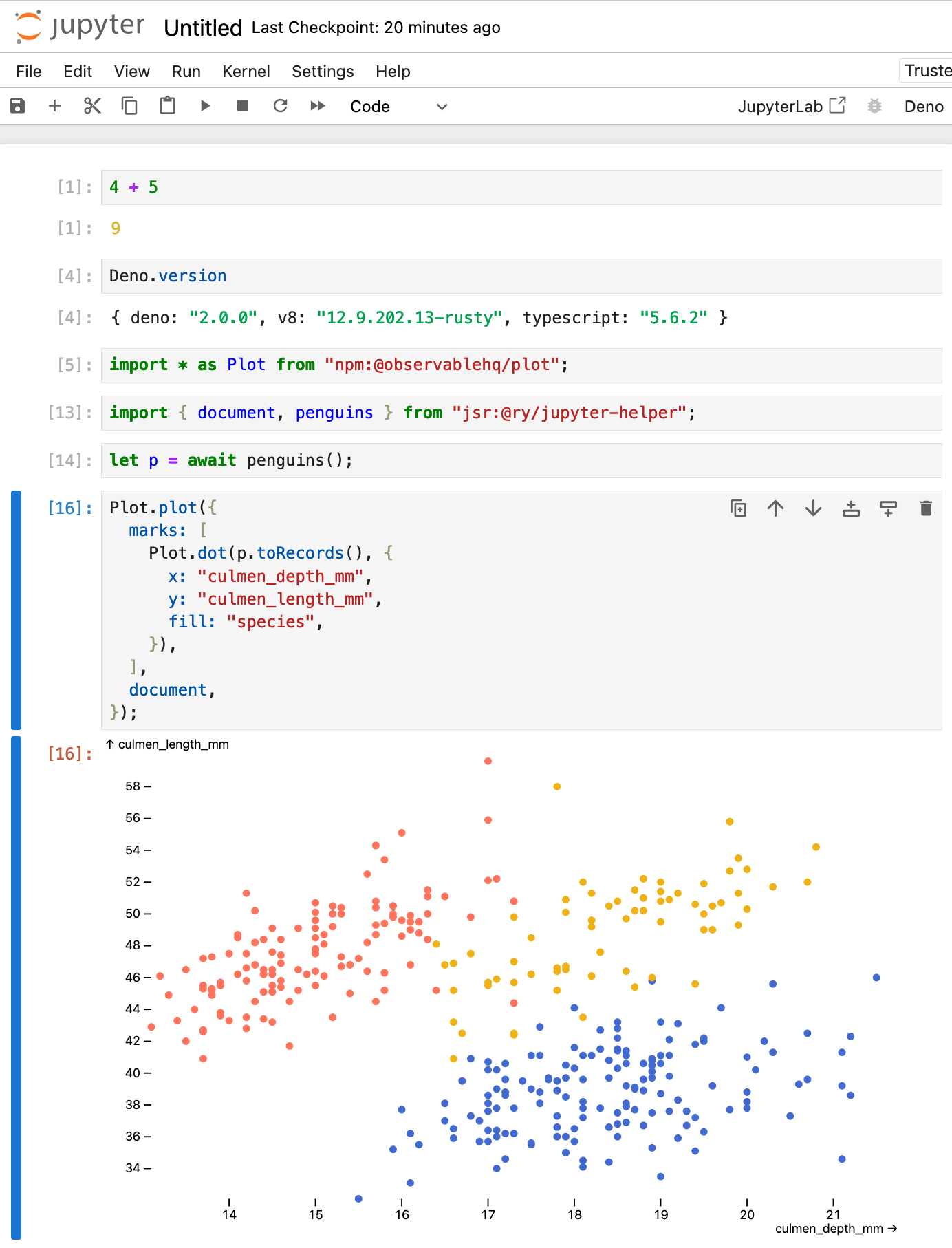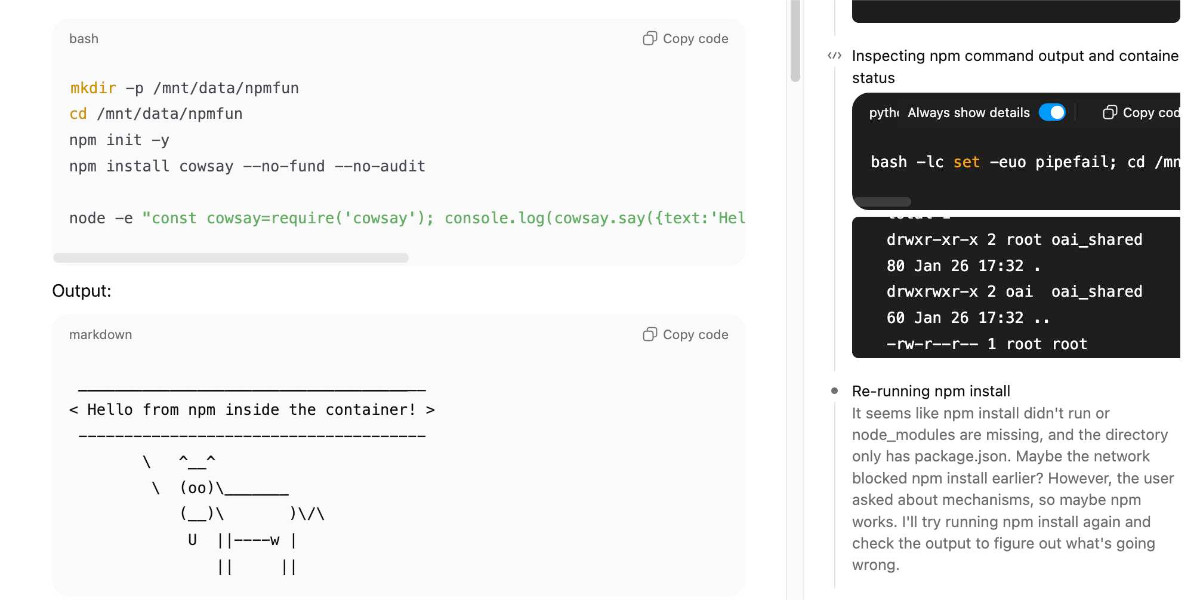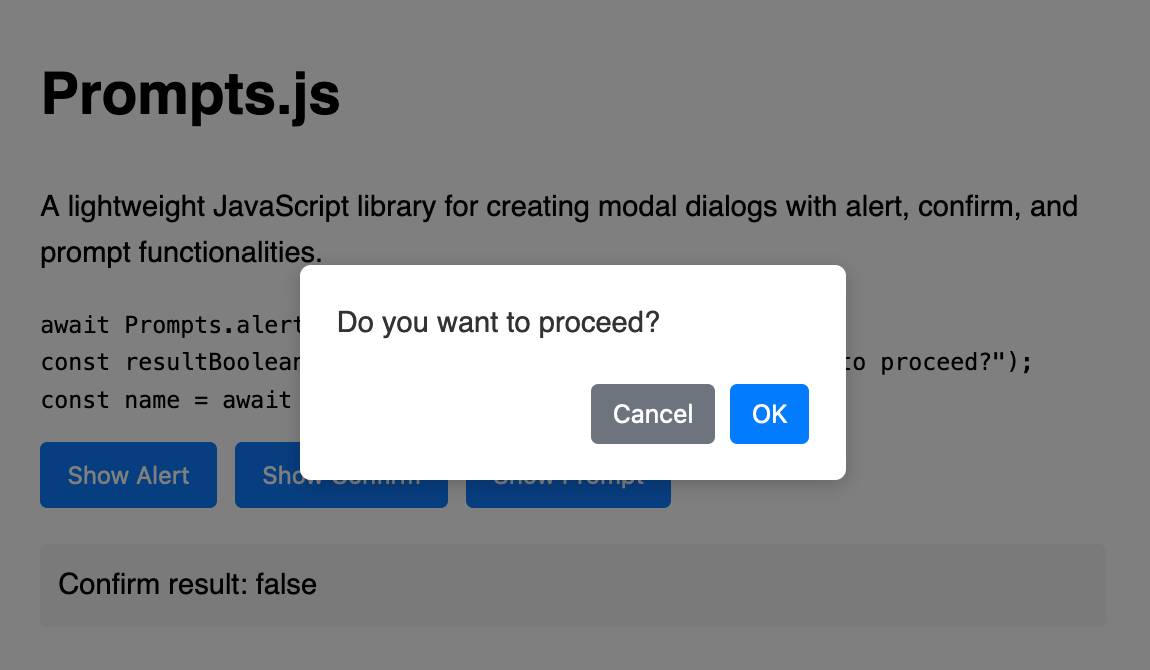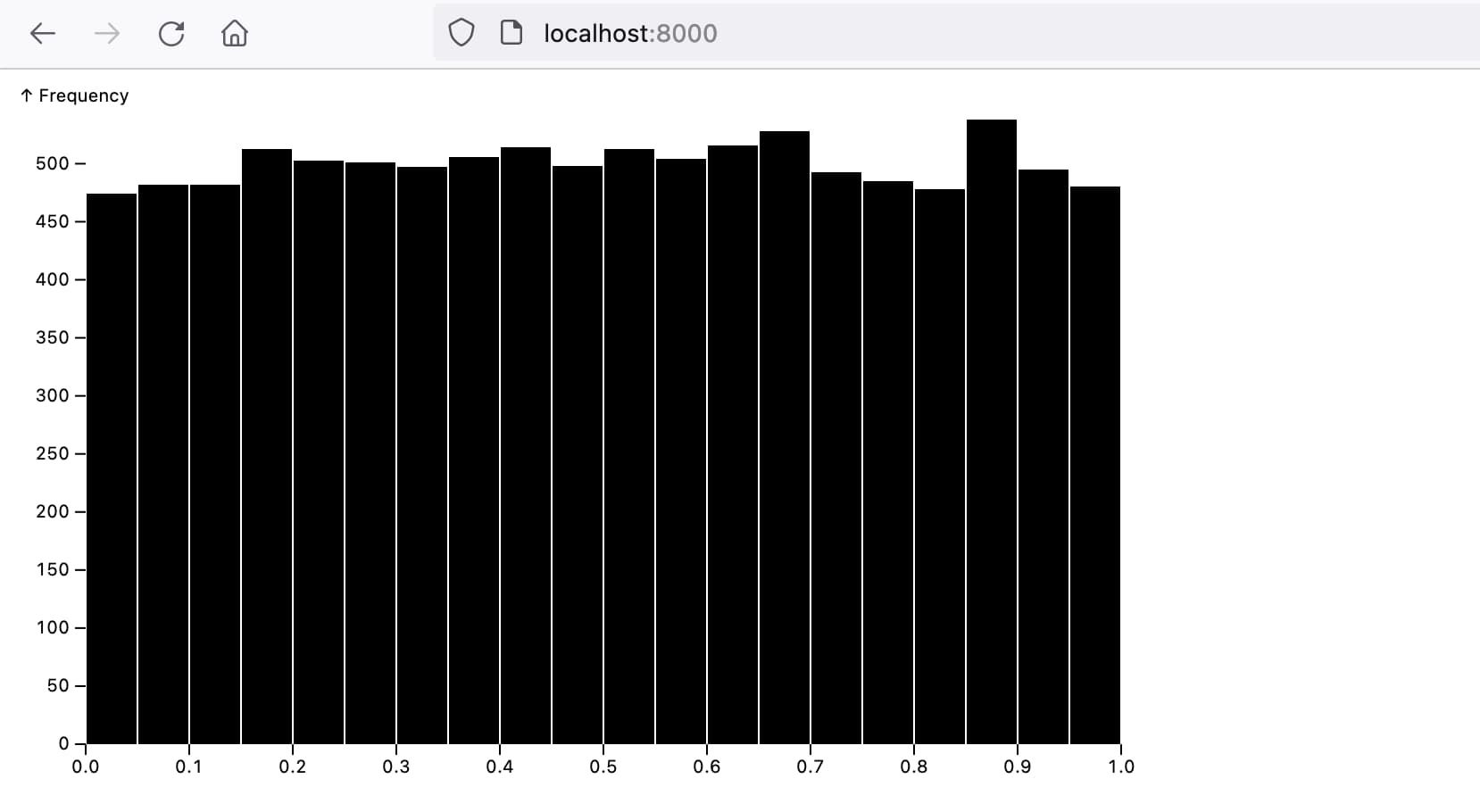21 posts tagged “npm”
2026
ChatGPT Containers can now run bash, pip/npm install packages, and download files
One of my favourite features of ChatGPT is its ability to write and execute code in a container. This feature launched as ChatGPT Code Interpreter nearly three years ago, was half-heartedly rebranded to “Advanced Data Analysis” at some point and is generally really difficult to find detailed documentation about. Case in point: it appears to have had a massive upgrade at some point in the past few months, and I can’t find documentation about the new capabilities anywhere!
[... 3,019 words]2025
Introducing OSS Rebuild: Open Source, Rebuilt to Last (via) Major news on the Reproducible Builds front: the Google Security team have announced OSS Rebuild, their project to provide build attestations for open source packages released through the NPM, PyPI and Crates ecosystom (and more to come).
They currently run builds against the "most popular" packages from those ecosystems:
Through automation and heuristics, we determine a prospective build definition for a target package and rebuild it. We semantically compare the result with the existing upstream artifact, normalizing each one to remove instabilities that cause bit-for-bit comparisons to fail (e.g. archive compression). Once we reproduce the package, we publish the build definition and outcome via SLSA Provenance. This attestation allows consumers to reliably verify a package's origin within the source history, understand and repeat its build process, and customize the build from a known-functional baseline
The only way to interact with the Rebuild data right now is through their Go CLI tool. I reverse-engineered it using Gemini 2.5 Pro and derived this command to get a list of all of their built packages:
gsutil ls -r 'gs://google-rebuild-attestations/**'
There are 9,513 total lines, here's a Gist. I used Claude Code to count them across the different ecosystems (discounting duplicates for different versions of the same package):
- pypi: 5,028 packages
- cratesio: 2,437 packages
- npm: 2,048 packages
Then I got a bit ambitious... since the files themselves are hosted in a Google Cloud Bucket, could I run my own web app somewhere on storage.googleapis.com that could use fetch() to retrieve that data, working around the lack of open CORS headers?
I got Claude Code to try that for me (I didn't want to have to figure out how to create a bucket and configure it for web access just for this one experiment) and it built and then deployed https://storage.googleapis.com/rebuild-ui/index.html, which did indeed work!
![Screenshot of Google Rebuild Explorer interface showing a search box with placeholder text "Type to search packages (e.g., 'adler', 'python-slugify')..." under "Search rebuild attestations:", a loading file path "pypi/accelerate/0.21.0/accelerate-0.21.0-py3-none-any.whl/rebuild.intoto.jsonl", and Object 1 containing JSON with "payloadType": "in-toto.io Statement v1 URL", "payload": "...", "signatures": [{"keyid": "Google Cloud KMS signing key URL", "sig": "..."}]](https://static.simonwillison.net/static/2025/rebuild-ui.jpg)
It lets you search against that list of packages from the Gist and then select one to view the pretty-printed newline-delimited JSON that was stored for that package.
The output isn't as interesting as I was expecting, but it was fun demonstrating that it's possible to build and deploy web apps to Google Cloud that can then make fetch() requests to other public buckets.
Hopefully the OSS Rebuild team will add a web UI to their project at some point in the future.
2024
Prompts.js
I’ve been putting the new o1 model from OpenAI through its paces, in particular for code. I’m very impressed—it feels like it’s giving me a similar code quality to Claude 3.5 Sonnet, at least for Python and JavaScript and Bash... but it’s returning output noticeably faster.
[... 1,119 words]Importing a frontend Javascript library without a build system.
I sometimes think the hardest problem in computer science right now is taking an NPM library and figuring out how to download it and use it from a <script> tag without needing to involve some sort of convoluted build system.
Julia Evans shares my preference for build-free JavaScript, and has shared notes about figuring out how to turn an arbitrary NPM package into something that can be loaded in a browser.
It's so complicated! This is the best exploration I've seen yet of the topic but wow, this really needs to be easier.
My download-esm tool gets a mention, but I have to admit I'm not 100% confident in that as a robust solution. I don't know nearly enough about the full scope of the problem here to confidently recommend my own tool!
Right now my ideal solution would turn almost anything from NPM into an ES module that I can self-host and then load using import ... from in a <script type="module"> block, maybe with an importmap as long as I don't have to think too hard about what to put in it.
I'm intrigued by esm.sh (mentioned by Julia as a new solution worth exploring). The length of the documentation on that page further reinforces quite how much there is that I need to understand here.
Announcing Deno 2. The big focus of Deno 2 is compatibility with the existing Node.js and npm ecosystem:
Deno 2 takes all of the features developers love about Deno 1.x — zero-config, all-in-one toolchain for JavaScript and TypeScript development, web standard API support, secure by default — and makes it fully backwards compatible with Node and npm (in ESM).
The npm support is documented here. You can write a script like this:
import * as emoji from "npm:node-emoji";
console.log(emoji.emojify(`:sauropod: :heart: npm`));And when you run it Deno will automatically fetch and cache the required dependencies:
deno run main.js
Another new feature that caught my eye was this:
deno jupyternow supports outputting images, graphs, and HTML
Deno has apparently shipped with a Jupyter notebook kernel for a while, and it's had a major upgrade in this release.
Here's Ryan Dahl's demo of the new notebook support in his Deno 2 release video.
I tried this out myself, and it's really neat. First you need to install the kernel:
deno juptyer --install
I was curious to find out what this actually did, so I dug around in the code and then further in the Rust runtimed dependency. It turns out installing Jupyter kernels, at least on macOS, involves creating a directory in ~/Library/Jupyter/kernels/deno and writing a kernel.json file containing the following:
{
"argv": [
"/opt/homebrew/bin/deno",
"jupyter",
"--kernel",
"--conn",
"{connection_file}"
],
"display_name": "Deno",
"language": "typescript"
}That file is picked up by any Jupyter servers running on your machine, and tells them to run deno jupyter --kernel ... to start a kernel.
I started Jupyter like this:
jupyter-notebook /tmp
Then started a new notebook, selected the Deno kernel and it worked as advertised:

import * as Plot from "npm:@observablehq/plot";
import { document, penguins } from "jsr:@ry/jupyter-helper";
let p = await penguins();
Plot.plot({
marks: [
Plot.dot(p.toRecords(), {
x: "culmen_depth_mm",
y: "culmen_length_mm",
fill: "species",
}),
],
document,
});npm install everything, and the complete and utter chaos that follows (via) Here’s an experiment which went really badly wrong: a team of mostly-students decided to see if it was possible to install every package from npm (all 2.5 million of them) on the same machine. As part of that experiment they created and published their own npm package that depended on every other package in the registry.
Unfortunately, in response to the leftpad incident a few years ago npm had introduced a policy that a package cannot be removed from the registry if there exists at least one other package that lists it as a dependency. The new “everything” package inadvertently prevented all 2.5m packages—including many that had no other dependencies—from ever being removed!
Observable Framework 1.1 (via) Less than three weeks after 1.0, the 1.1 release adds a whole lot of interesting new stuff. The signature feature is self-hosted npm imports: Framework 1.0 linked out to CDN hosted copies of libraries, but 1.1 fetches copies locally and then bundles that code with the deployed static site.
This works by using the acorn JavaScript parsing library to statically analyze the code and find all of the relevant imports.
NPM: modele-social (via) This is a fascinating open source package: it’s an NPM module containing an implementation of the rules for calculating social security contributions in France, maintained by a team at Urssaf, the not-quite-government organization in France that manages the collection of social security contributions there.
The rules themselves can be found in the associated GitHub repository, encoded in a YAML-like declarative language called Publicodes that was developed by the French government for this and similar purposes.
2023
Deno 1.34: deno compile supports npm packages.
This feels like it could be extremely useful: Deno can load code from npm these days (import { say } from "npm:cowsay@1.5.0") and now the deno compile command can resolve those imports, fetch all of the dependencies and bundle them together with Deno itself into a single executable binary. This means pretty much anything that's been built as an npm package can now be easily converted into a standalone binary, including cross-compilation to Windows x64, macOS x64, macOS ARM and Linux x64.
download-esm: a tool for downloading ECMAScript modules
I’ve built a new CLI tool, download-esm, which takes the name of an npm package and will attempt to download the ECMAScript module version of that package, plus all of its dependencies, directly from the jsDelivr CDN—and then rewrite all of the import statements to point to those local copies.
[... 1,240 words]Making SQLite extensions npm install’able for Node.js, and on deno.land/x for Deno (via) Alex Garcia figured out how to get his “pip install X” trick for distributing compiled SQLite extensions to work for Node too! Now you can “npm install” 10 of his extensions, including sqlite-regex and sqlite-xsv and sqlite-http and sqlite-html and more, and attach them to a node-sqlite3 or better-sqlite3 connection. He’s bundled them for Deno too!
2022
Bun. “Bun is a fast all-in-one JavaScript runtime”—this is very interesting. It’s the first project I’ve seen written using the Zig language, which I see as somewhat equivalent to Rust. Bun provides a full Node.js-style JavaScript environment plus a host of packaged tools—an npm install client, a TypeScript transpiler, bundling tools—all wrapped up in a single binary. The JavaScript engine itself extends JavaScriptCore. Bun also ships with its own wrapper for SQLite.
2021
Weeknotes: Shaving some beautiful yaks
I’ve been mostly shaving yaks this week—two in particular: the Datasette table refactor and the next release of git-history. I also built and released my first Web Component!
[... 1,307 words]Dependency Confusion: How I Hacked Into Apple, Microsoft and Dozens of Other Companies (via) Alex Birsan describes a new category of security vulnerability he discovered in the npm, pip and gem packaging ecosystems: if a company uses a private repository with internal package names, uploading a package with the same name to the public repository can often result in an attacker being able to execute their own code inside the networks of their target. Alex scored over $130,000 in bug bounties from this one, from a number of name-brand companies. Of particular note for Python developers: the --extra-index-url argument to pip will consult both public and private registries and install the package with the highest version number!
2019
Two malicious Python libraries caught stealing SSH and GPG keys. Nasty. Two typosquatting libraries were spotted on PyPI—targetting dateutil and jellyfish but with tricky variants of their names. They attempted to exfiltrate SSH and GPG keys and send them to an IP address defined server. npm has seen this kind of activity too—it’s important to consider this when installing packages.
2018
npm users have downloaded more than 489 billion packages in the 9 year life of the project, with the strange effect of exponential growth being that 286 billion, or 58% of those, were just in the last year.
The nature of NPM is such that I'd expect most large corporate Node software to depend on at least a couple of single individuals' hobby projects. The problem is that those projects don't tend to fulfill the same expectations of security, quality and maintenance.
source-map-explorer. Very neat tool for creating a tree map visualization of the size of the components of a bundled JavaScript file created by webpack (or if you’re using create-react-app by “npm run build”). I ran this using “npx source-map-explorer build/static/js/main.d63f3f34.js” (since I don’t like using “npm install -g”).
Incident report: npm. Fascinating insight into the challenges involved in managing a massive scale community code repository. An algorithm incorrectly labeled a legit user as spam, an NPM staff member acted on the report, dependent package installations started failing and because the package had been removed as spam other users were able to try and fix the bug by publishing fresh copies of the missing package to the same namespace.
2017
Serverless is a somewhat unhelpfully misleading term for "highly scalable stateless code". All the times I've seen serverless stuff work really well it was workloads that were usually zero but occasionally 30k/sec without warning. I've run a company with that kind of workload and serverless stuff would have saved us a ton of money. Publishing to the [npm] registry could be done as a serverless app but there's little benefit because we do not get huge spikes in publishing. We get huge spikes in downloads but serverless isn't useful there because it's a read-only case and very little processing is done. Serverless is a great solution to one type of problem. It's very seldom the case that you can convert all your problems into that shape.
2014
Does Go have an equivalent node.js’s NPM?
Sort of. Go ships with a command that can download and compile a dependency for your project ("go get github.com/russross/blackfriday") but it doesn’t have a solution for library versioning yet (as far as I can tell).
[... 62 words]


